
Introduction
I've been wanting to break down different foods in many common food groups for a while now, and now is finally time to get seedy. Seeds, along with nuts, are nutrient power houses, being chock full (pun intended) of healthy fats, fiber, vitamins, and minerals. I will be listing various types of seeds, along with a minor description of the product, healthy benefits, and a simple nutrition facts panel per serving size.
Seeds are basically nut free nuts, if that makes any sense. They have a similar nutritional profile, being particularly high in healthy fats, calories and various minerals, contain a moderate amount of protein and fiber, and are low in net carbs. Each seed will be considered under a standard serving size of 1 oz (28 g), which makes them easy to compare.
The way I see it, there are 2 main kinds of seeds: the 'butter-able', and 'non-butter-able'. What I mean by this, is which seeds can be turned into a nut butter, and which cannot. Hemp, pumpkin, sesame, and sunflower seeds are example of the former, whereas chia, flax, and poppy are all instances of the latter. This is because the former have higher fat content relative to their fiber content, allowing them to become a creamy 'nut' butter when blended.

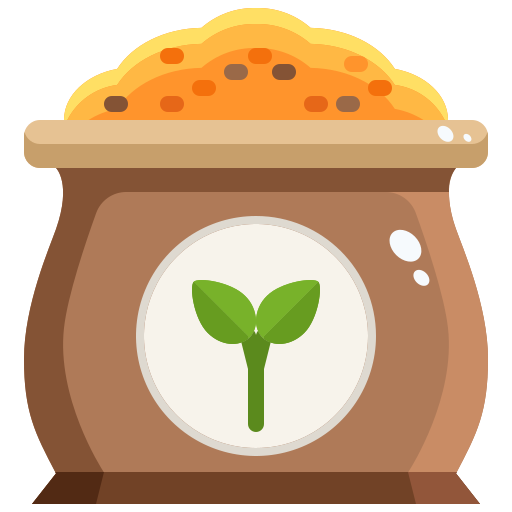
Other Posts in this Series


Contents
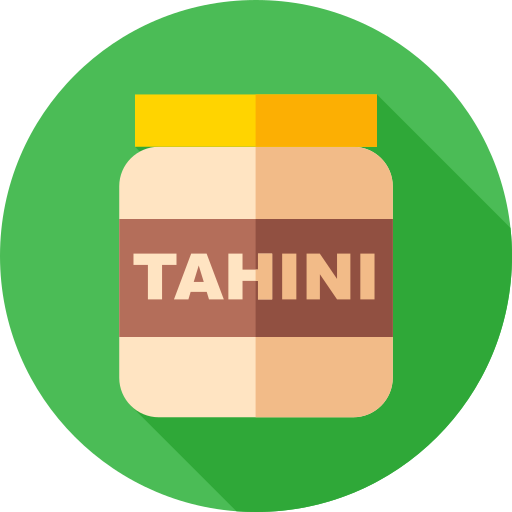

Chia seeds contain an ungodly amount of fiber. Per serving (1 oz, 28 g), chia seeds have a whopping 10 g of fiber, the highest amount of fiber per serving that I analyzed in Fiber: Happiness is a Good Poop. They're also high in healthy fats, contain a surprising amount of protein, and are also high in the minerals calcium, copper, iron, magnesium, manganese, selenium, and zinc.
Chia seeds are often compared to flax seeds, as they are similar both in their nutritional profile and use. Both these kinds of seeds are high in the omega-3 fatty acid ALA, supporting heart and brain health. You can generally substitute one for the other with little change to the end product. Like with flax seeds, you can create a 'chia egg' by combining 1 tbsp (12 g) chia seeds with 3 tbsp (45 g) water, and waiting 5-10 minutes. The chia seeds will then swell up and absorb a lot of the water, creating a texture similar to a raw egg. Chia eggs can be used to replace a standard egg in vegan baking.
Chia seeds's fantastic ability to absorb liquids are why they're frequently used in overnight oats. Just mix together in a container, refrigerate overnight, and allow the magic to happen, creating a thick and delicious breakfast. Chia seeds can also be used in making jam, like in my Strawberry Chia Jam. Check out any of my overnight oat and yogurt bowl recipes with chia seeds below:
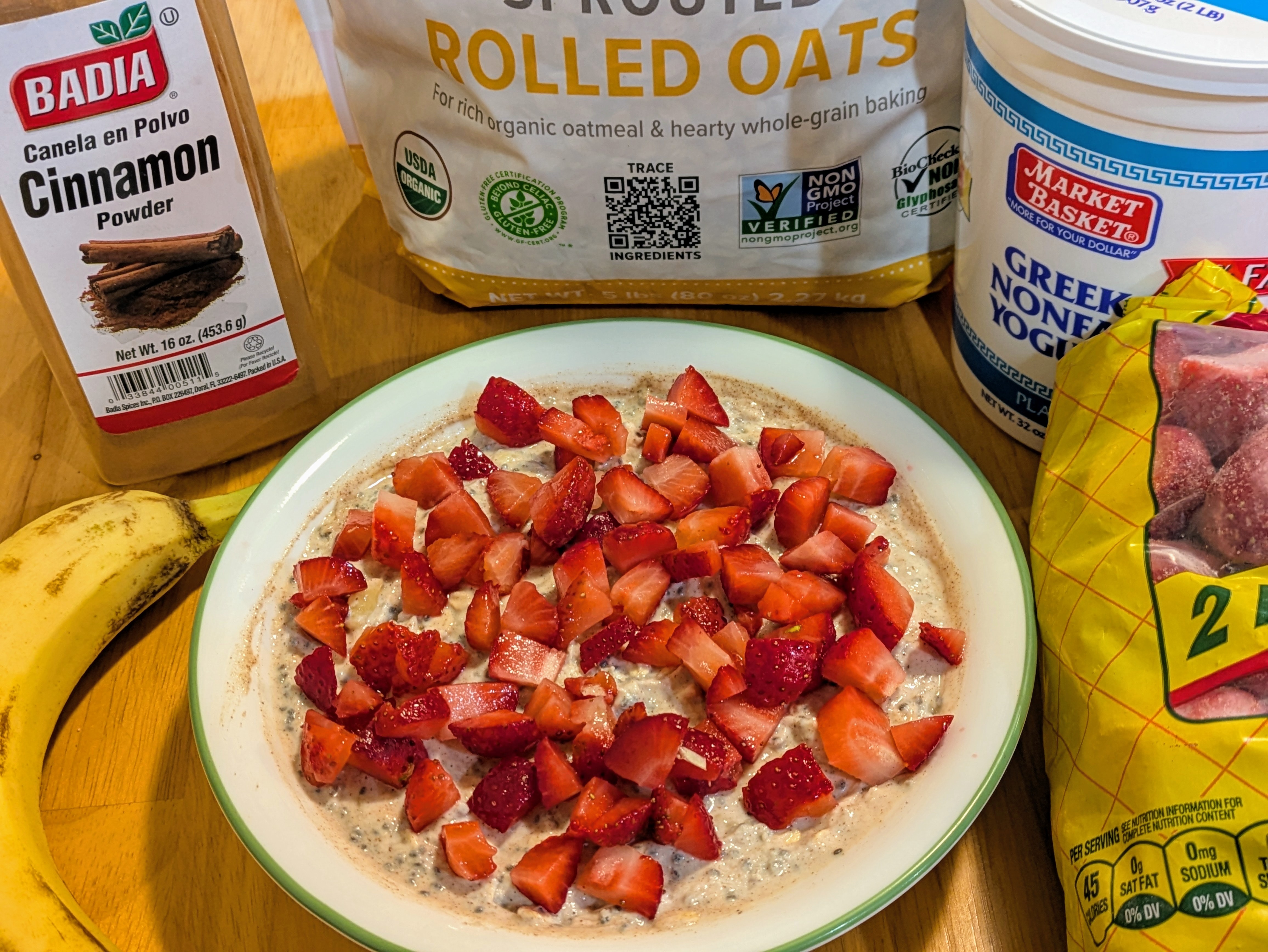
Serving Size: 1 oz (28 g)
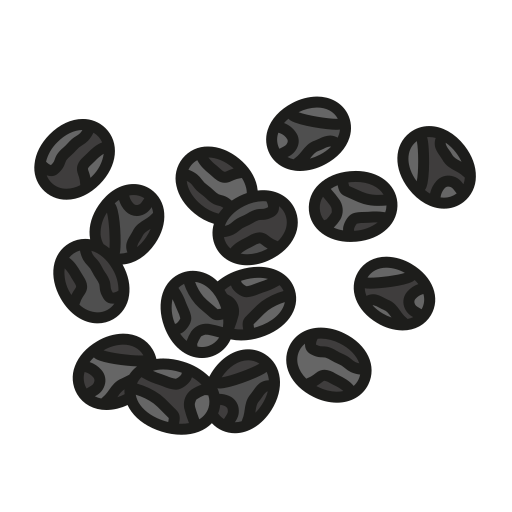
Flax seeds don't have quite as much fiber as chia seeds, but they are still packed full if it. Per serving (1 oz, 28 g), flax seeds contain 8 g of fiber, supporting disgestion and gut health. They're also high in healthy fats, contain a surprising amount of protein, and are also high in the minerals copper, iron, magnesium, manganese, phosphorus, selenium, and zinc. Flax seeds are also a rich source of vitamin B1, supporting nerve health.
Flax seeds are often compared to chia seeds, as they are similar both in their nutritional profile and use. Both these kinds of seeds are high in the omega-3 fatty acid ALA, supporting heart and brain health. You can generally substitute one for the other with little change to the end product. Like with chia seeds, you can create a 'flax egg' by combining 1 tbsp (7 g) ground flax seeds with 3 tbsp (45 g) water, and waiting 5-10 minutes. The flax will then swell up and absorb a lot of the water, creating a texture similar to a raw egg. Flax eggs can be used to replace a standard egg in vegan baking.
Generally, flaxseeds should be ground, as the body cannot efficiently absorb the nutrients from flax in the whole seed form. Ground flaxseed is a very versatile ingredient. It can be mixed into oatmeal or yogurt, utilized in homemade breadcrumbs, or used as a flour in baking. Below are some great uses for flax seeds:
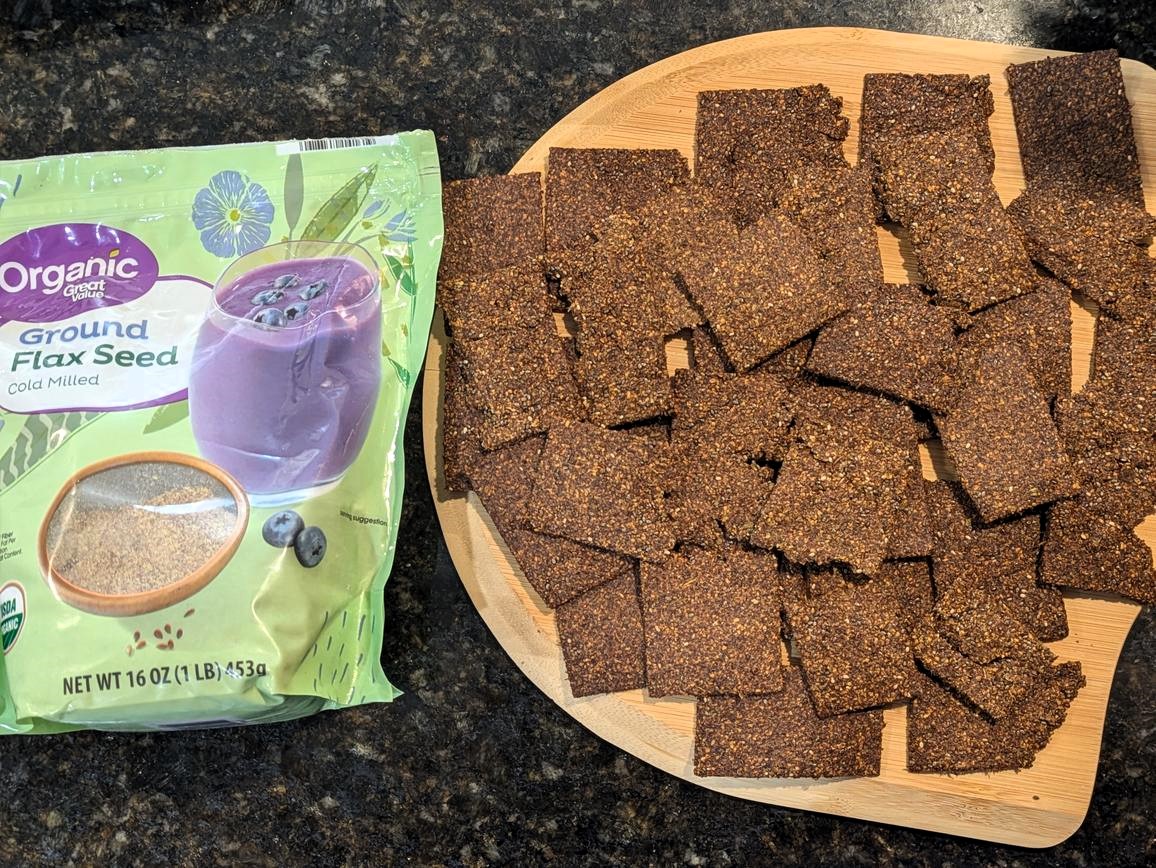
Serving Size: 1 oz (28 g)
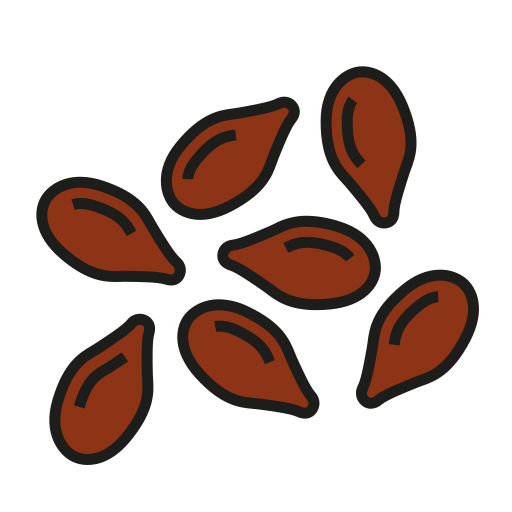
Shelled hemp seeds are a very high source of plant based protein. In a 1 oz (28 g) serving, hemp seeds contain 9 g of protein in 157 calories. This is a pretty good protein to calorie ratio for a non-animal based food, and can provide a nice supplementary amount of protein to your diet. Hemp seeds are also a rich source of unsaturated fats, particularly omega-3s (ALA), and contain little net carbs.
Before you ask, no hemp seeds do not contain any THC; you cannot get high off hemp seeds. Under the hood, hemp seeds contain a notable amount of some vitamins and minerals. These include vitamin B1, vitamin B3, vitamin B6, copper, iron, magnesium, phosphorus, and zinc One serving (1 oz, 28 g) contains contains nearly 100% of the RDA (recommended daily intake) of manganese, which is plays a crucial role in bone development and wound healing.
Also known as hemp hearts, these little seeds are notably a complete protein, meaning they contain adequate amounts of all 9 essential amino acids. Very little plant based foods can be considered a complete protein, including soybeans and quinoa. Hemp seeds can be sprinkled on top of a salad, mixed into oatmeal or yogurt, or blended into a smoothie, like my Green Hemp Smoothie, which mixes hemp seeds with banana, spinach, and milk.

Serving Size: 1 oz (28 g)
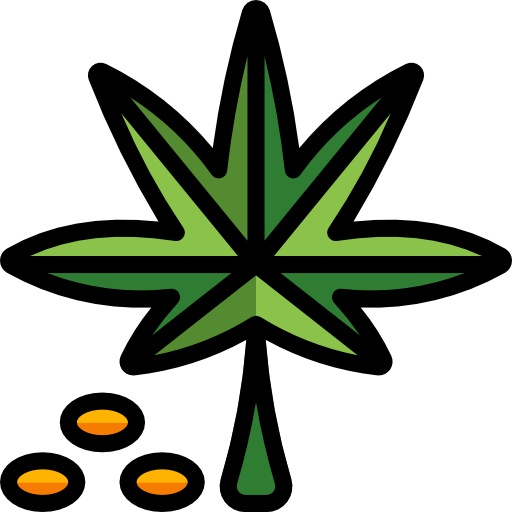
Have you ever thought about eating poppy seeds? I certainly haven't. To me, these little black seeds only exist in everything bagel seasoning; same with sesame seeds. But you certainly can mix them into things like you would with any other seeds. Poppy seeds are a good source of healthy fats, fiber, protein, vitamin B1, calcium, copper, iron, magnesium, manganese, phosphorus, and zinc. Just don't eat too many of them, or you can test positive for opiates. I have no recipes using poppy seeds in particular, but I do like them on top of my avocado toast and salads.

Serving Size: 1 oz (28 g)

Pumpkin seeds, also known as pepitas, are a green shelled seed that are high in unsaturated fat with quite a bit of protein. Due to their high fat content relative to fiber, you can certainly make a pumpkin seed butter by blending together roasted pumpkin seeds. In my Frosted Pumpkin Cake, I utilized homemade pumpkin seed butter in both the cake and frosting for triple pumpkin (in addition to pumpkin puree). For a flavored 'nut' butter, which mixes together sunflower seeds and pumpkin seeds, check out my Super Seed Butter, which also features chia seeds and flax seeds.
Notably, pumpkin seeds are quite a rich source of iron, only bested by sesame seeds. The Iron Bowl is a recipe of mine utilizing spinach, ground beef, lentils, and of course pumpkin seeds for a high iron meal. Iron plays a pivotal role in the formation of red blood cells, production of adenosine triphosphate (ATP), and the transportation of oxygen throughout the body.
Pumpkin seeds can also be sprinkled on top of salads or Date Night Superfood Bowls, baked into a Nordic Nut Loaf, or used as a substitute for any other nut or seed, such as peanuts, almonds, pistachios, walnuts, or sunflower seeds.
In addition to iron, pumpkin seeds are rich in the minerals copper, magnesium, manganese, phosphorus, and zinc. They're lower in fiber and vitamins than some other nuts or seeds, but that's more than made up for in it's mineral content. Pumpkin seeds may help support immune function and energy metabolism.
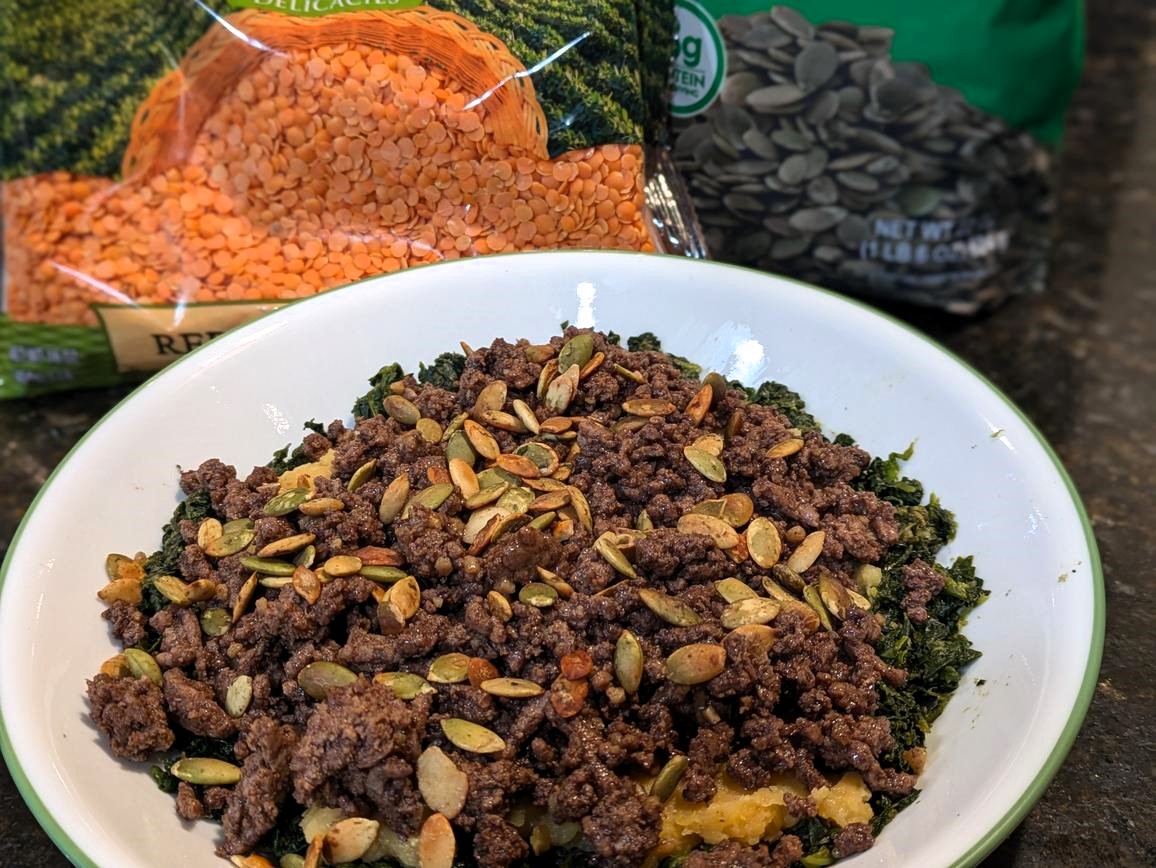
Serving Size: 1 oz (28 g)
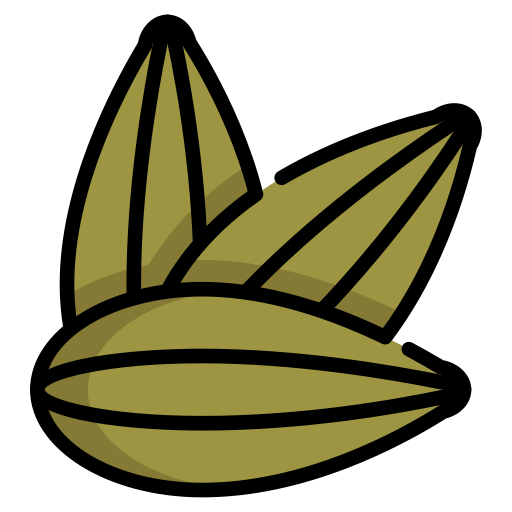
Like poppy seeds, I've never really thought about just eating sesame seeds. Like the other 'butter-able' seeds, sesame seeds are high in healthy fats, particularly monounsaturated fats, which are shown to protect heart health. Sesame seeds contain a moderate amount of fiber and protein, and are good sources of a variety of micronutrients, including thiamin, vitamin B6, calcium, copper, magnesium, manganese, phosphorus, selenium, and zinc. Sesame seeds also contain the antioxidants sesamin and sesamolin, which are helpful in reducing inflammation.
Sesame seed butter is actually very common, but you'd know it under the name tahini. Tahini is traditionally used in hummus for its creamy texture and neutral taste. You can check out my Classic Tahini Hummus or Lemon Baba Ganoush Without Oil for great dips using tahini. Most of my hummus recipes actually call for almond butter instead, simply because I'm more likely to have almond butter in my kitchen than tahini, but feel free to swap out the almond butter for tahini anytime you see fit.
But tahini can be used in so much more than hummus. You can use it as a nut-free peanut butter substitute in baking, like in my Pumpkin Spice Apple Bread, where I called for tahini as my main fat instead of natural peanut butter or almond butter. I've personally done this substitution many times in some of my healthier desserts, breakfasts, and more, either to accomodate a nut allergy, or simply because it was what I had at the time. Examples include Fatty Yogurt, Homemade Thin Mint Cookies, No Bake Energy Bites, and Roasted Red Pepper Hummus.
Note that while sesame seeds are the highest nut or seed in iron, this does not translate to tahini. For reference 1 oz (28 g) serving of sesame seeds contains 4.1 mg (23 % DV) of iron, whereas the same amount of tahini only has 2.0 mg (11 %). This is because most brands of tahini used hulled sesame seeds, or sesame seeds with the outer layer removed. As the outer layer contains a significant amount of its iron content, the amount of iron is thus lower in tahini. I've never made my own homemade tahini, but I imagine you can by roasting and blending whole sesame seeds, and then have a tahini with a higher iron content.
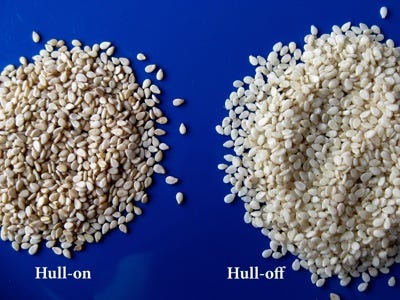
Serving Size: 1 oz (28 g)
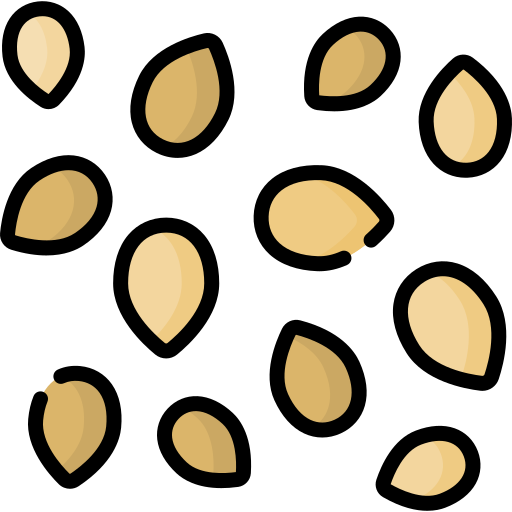
Last but not least, we have sunflower seeds. I probably sound like a broken record by now, but sunflower seeds are high in healthy fats, contain a moderate amount of protein and fiber, and are low in net carbs. As for minerals, sunflower seeds are a good source of copper, magnesium, manganese, phosphorus, selenium, and zinc.
What's unique to sunflower seeds is its particularly high content of vitamins B1 and E. A 1 oz (28 g) serving contains 35% and 66% of the daily recommended value of vitamin B1 and vitamin E, respectively. Sunflower seeds actually contain more vitamin E than almonds, a food known for its high levels of vitamin E. Vitamin E plays a critical role in skin, heart, and eye health.
Sunflower seeds can be sprinkled on top of salads or Date Night Superfood Bowls, baked into a Nordic Nut Loaf, or used as a substitute for any other nut or seed, such as peanuts, almonds, pistachios, walnuts, or pumpkin seeds.
Sunflower seeds, and by extension sunflower seed butter, are probably the most common allergen friendly substitute for peanuts and peanut butter. For a flavored 'nut' butter, which mixes together pumpkin seeds and sunflower seeds, check out my Super Seed Butter, which also features chia seeds and flax seeds.
Interestingly, if you mix sunflower seed butter and baking soda, upon baking a reaction occurs that turns the product green. I've demonstrated this feat of chemistry in my Green Bread - No Food Dye, Mint Chocolate Chip Date Cookies, and Dye Free Rainbow Cookies, where you can turn baked goods green without the need for synthetic food coloring.

Serving Size: 1 oz (28 g)

Nutritional Comparison
Scroll to the right to read information about every variation

References
This post may contain affiliate links
I've been wanting to break down different foods in many common food groups for a while now, and now is finally time to get seedy. Seeds, along with nuts, are nutrient power houses, being chock full (pun intended) of healthy fats, fiber, vitamins, and minerals. I will be listing various types of seeds, along with a minor description of the product, healthy benefits, and a simple nutrition facts panel per serving size.
Seeds are basically nut free nuts, if that makes any sense. They have a similar nutritional profile, being particularly high in healthy fats, calories and various minerals, contain a moderate amount of protein and fiber, and are low in net carbs. Each seed will be considered under a standard serving size of 1 oz (28 g), which makes them easy to compare.
The way I see it, there are 2 main kinds of seeds: the 'butter-able', and 'non-butter-able'. What I mean by this, is which seeds can be turned into a nut butter, and which cannot. Hemp, pumpkin, sesame, and sunflower seeds are example of the former, whereas chia, flax, and poppy are all instances of the latter. This is because the former have higher fat content relative to their fiber content, allowing them to become a creamy 'nut' butter when blended.


Other Posts in this Series
- Let's Meet The Meats
- I'm Nuts For Nuts
- I See Seeds In Your Future
- Beans Beans The Musical Fruit
- Going Bananas For Bananas
- Lettuce Turnip The Beet
- I'm Hooked On Fish
- A Grain Of Truth
- I'm Dying For Dairy


Contents
- Chia Seeds
- Flax Seeds
- Hemp Seeds
- Poppy Seeds
- Pumpkin Seeds
- Sesame Seeds
- Sunflower Seeds
- Nutritional Comparison


Chia seeds contain an ungodly amount of fiber. Per serving (1 oz, 28 g), chia seeds have a whopping 10 g of fiber, the highest amount of fiber per serving that I analyzed in Fiber: Happiness is a Good Poop. They're also high in healthy fats, contain a surprising amount of protein, and are also high in the minerals calcium, copper, iron, magnesium, manganese, selenium, and zinc.
Chia seeds are often compared to flax seeds, as they are similar both in their nutritional profile and use. Both these kinds of seeds are high in the omega-3 fatty acid ALA, supporting heart and brain health. You can generally substitute one for the other with little change to the end product. Like with flax seeds, you can create a 'chia egg' by combining 1 tbsp (12 g) chia seeds with 3 tbsp (45 g) water, and waiting 5-10 minutes. The chia seeds will then swell up and absorb a lot of the water, creating a texture similar to a raw egg. Chia eggs can be used to replace a standard egg in vegan baking.
Chia seeds's fantastic ability to absorb liquids are why they're frequently used in overnight oats. Just mix together in a container, refrigerate overnight, and allow the magic to happen, creating a thick and delicious breakfast. Chia seeds can also be used in making jam, like in my Strawberry Chia Jam. Check out any of my overnight oat and yogurt bowl recipes with chia seeds below:
- Overnight Oats with no Protein Powder
- Strawberry Chia Protein Oatmeal
- Yogurt Free Protein Oats
- Very Vic
- Omega-3 Yogurt Bowl
- Brain Boosting Yogurt
- Banana Nut Bread Protein Overnight Oats
- Peanut Butter Punch Protein Overnight Oats
- Berry Delicious Protein Overnight Oats
- Pumpkin Pie Protein Overnight Oats
- Reese's Protein Overnight Oats

------------------------------------------
Calories: 135
------------------------------------------
Total Fat: 8.6g (11 %)
Total Carbohydrate: 11.8g (4 %)
Fiber: 9.6g (34 %)
Net Carbs: 2.2g
Protein: 4.6g (9 %)
------------------------------------------
------------------------------------------
Vitamin B1 (Thiamin): 0.17mg (14 %)
Vitamin E: 0.14mg (1 %)
------------------------------------------
Copper: 0.26mg (29 %)
Iron: 2.17mg (12 %)
Magnesium: 94mg (22 %)
Manganese: 0.76mg (33 %)

Flax seeds don't have quite as much fiber as chia seeds, but they are still packed full if it. Per serving (1 oz, 28 g), flax seeds contain 8 g of fiber, supporting disgestion and gut health. They're also high in healthy fats, contain a surprising amount of protein, and are also high in the minerals copper, iron, magnesium, manganese, phosphorus, selenium, and zinc. Flax seeds are also a rich source of vitamin B1, supporting nerve health.
Flax seeds are often compared to chia seeds, as they are similar both in their nutritional profile and use. Both these kinds of seeds are high in the omega-3 fatty acid ALA, supporting heart and brain health. You can generally substitute one for the other with little change to the end product. Like with chia seeds, you can create a 'flax egg' by combining 1 tbsp (7 g) ground flax seeds with 3 tbsp (45 g) water, and waiting 5-10 minutes. The flax will then swell up and absorb a lot of the water, creating a texture similar to a raw egg. Flax eggs can be used to replace a standard egg in vegan baking.
Generally, flaxseeds should be ground, as the body cannot efficiently absorb the nutrients from flax in the whole seed form. Ground flaxseed is a very versatile ingredient. It can be mixed into oatmeal or yogurt, utilized in homemade breadcrumbs, or used as a flour in baking. Below are some great uses for flax seeds:
- Almond Flour Sandwich Loaf
- Almond Flour Rolls & Bagels
- Fatty Yogurt
- Gluten Free Shrimp Oreganata
- Gluten Free Flaxseed Crackers
- Cauliflower Flaxseed Pizza Crust
- Nordic Nut Loaf
- Gluten Free Millet Bread
- No Bake Energy Bites
- Omega-3 Yogurt Bowl
- Banana Nut Bread Protein Overnight Oats
- Berry Delicious Protein Overnight Oats
- Pumpkin Pie Protein Overnight Oats
- Reese's Protein Overnight Oats

------------------------------------------
Calories: 149
------------------------------------------
Total Fat: 11.8g (15 %)
Total Carbohydrate: 8.1g (3 %)
Fiber: 7.6g (27 %)
Net Carbs: 0.5g
Protein: 5.1g (10 %)
------------------------------------------
------------------------------------------
Vitamin B1 (Thiamin): 0.46mg (38 %)
Vitamin E: 0.09mg (1 %)
------------------------------------------
Copper: 0.34mg (38 %)
Iron: 1.59mg (9 %)
Magnesium: 110mg (26 %)
Manganese: 0.7mg (30 %)

Shelled hemp seeds are a very high source of plant based protein. In a 1 oz (28 g) serving, hemp seeds contain 9 g of protein in 157 calories. This is a pretty good protein to calorie ratio for a non-animal based food, and can provide a nice supplementary amount of protein to your diet. Hemp seeds are also a rich source of unsaturated fats, particularly omega-3s (ALA), and contain little net carbs.
Before you ask, no hemp seeds do not contain any THC; you cannot get high off hemp seeds. Under the hood, hemp seeds contain a notable amount of some vitamins and minerals. These include vitamin B1, vitamin B3, vitamin B6, copper, iron, magnesium, phosphorus, and zinc One serving (1 oz, 28 g) contains contains nearly 100% of the RDA (recommended daily intake) of manganese, which is plays a crucial role in bone development and wound healing.
Also known as hemp hearts, these little seeds are notably a complete protein, meaning they contain adequate amounts of all 9 essential amino acids. Very little plant based foods can be considered a complete protein, including soybeans and quinoa. Hemp seeds can be sprinkled on top of a salad, mixed into oatmeal or yogurt, or blended into a smoothie, like my Green Hemp Smoothie, which mixes hemp seeds with banana, spinach, and milk.

------------------------------------------
Calories: 155
------------------------------------------
Total Fat: 13.7g (17 %)
Total Carbohydrate: 2.4g (1 %)
Fiber: 1.1g (4 %)
Net Carbs: 1.3g
Protein: 8.8g (18 %)
------------------------------------------
------------------------------------------
Vitamin B1 (Thiamin): 0.36mg (30 %)
Vitamin E: 0.22mg (1 %)
------------------------------------------
Copper: 0.45mg (50 %)
Iron: 2.23mg (12 %)
Magnesium: 196mg (47 %)
Manganese: 2.13mg (92 %)

Have you ever thought about eating poppy seeds? I certainly haven't. To me, these little black seeds only exist in everything bagel seasoning; same with sesame seeds. But you certainly can mix them into things like you would with any other seeds. Poppy seeds are a good source of healthy fats, fiber, protein, vitamin B1, calcium, copper, iron, magnesium, manganese, phosphorus, and zinc. Just don't eat too many of them, or you can test positive for opiates. I have no recipes using poppy seeds in particular, but I do like them on top of my avocado toast and salads.

------------------------------------------
Calories: 147
------------------------------------------
Total Fat: 11.6g (15 %)
Total Carbohydrate: 7.9g (3 %)
Fiber: 5.5g (20 %)
Net Carbs: 2.4g
Protein: 5.0g (10 %)
------------------------------------------
------------------------------------------
Vitamin B1 (Thiamin): 0.24mg (20 %)
Vitamin E: 0.5mg (3 %)
------------------------------------------
Copper: 0.46mg (51 %)
Iron: 2.73mg (15 %)
Magnesium: 97mg (23 %)
Manganese: 1.88mg (82 %)

Pumpkin seeds, also known as pepitas, are a green shelled seed that are high in unsaturated fat with quite a bit of protein. Due to their high fat content relative to fiber, you can certainly make a pumpkin seed butter by blending together roasted pumpkin seeds. In my Frosted Pumpkin Cake, I utilized homemade pumpkin seed butter in both the cake and frosting for triple pumpkin (in addition to pumpkin puree). For a flavored 'nut' butter, which mixes together sunflower seeds and pumpkin seeds, check out my Super Seed Butter, which also features chia seeds and flax seeds.
Notably, pumpkin seeds are quite a rich source of iron, only bested by sesame seeds. The Iron Bowl is a recipe of mine utilizing spinach, ground beef, lentils, and of course pumpkin seeds for a high iron meal. Iron plays a pivotal role in the formation of red blood cells, production of adenosine triphosphate (ATP), and the transportation of oxygen throughout the body.
Pumpkin seeds can also be sprinkled on top of salads or Date Night Superfood Bowls, baked into a Nordic Nut Loaf, or used as a substitute for any other nut or seed, such as peanuts, almonds, pistachios, walnuts, or sunflower seeds.
In addition to iron, pumpkin seeds are rich in the minerals copper, magnesium, manganese, phosphorus, and zinc. They're lower in fiber and vitamins than some other nuts or seeds, but that's more than made up for in it's mineral content. Pumpkin seeds may help support immune function and energy metabolism.

------------------------------------------
Calories: 157
------------------------------------------
Total Fat: 13.7g (18 %)
Total Carbohydrate: 3.0g (1 %)
Fiber: 1.7g (6 %)
Net Carbs: 1.3g
Protein: 8.5g (17 %)
------------------------------------------
------------------------------------------
Vitamin B1 (Thiamin): 0.08mg (6 %)
Vitamin E: 0.61mg (4 %)
------------------------------------------
Copper: 0.38mg (42 %)
Iron: 2.47mg (14 %)
Magnesium: 166mg (39 %)
Manganese: 1.27mg (55 %)

Like poppy seeds, I've never really thought about just eating sesame seeds. Like the other 'butter-able' seeds, sesame seeds are high in healthy fats, particularly monounsaturated fats, which are shown to protect heart health. Sesame seeds contain a moderate amount of fiber and protein, and are good sources of a variety of micronutrients, including thiamin, vitamin B6, calcium, copper, magnesium, manganese, phosphorus, selenium, and zinc. Sesame seeds also contain the antioxidants sesamin and sesamolin, which are helpful in reducing inflammation.
Sesame seed butter is actually very common, but you'd know it under the name tahini. Tahini is traditionally used in hummus for its creamy texture and neutral taste. You can check out my Classic Tahini Hummus or Lemon Baba Ganoush Without Oil for great dips using tahini. Most of my hummus recipes actually call for almond butter instead, simply because I'm more likely to have almond butter in my kitchen than tahini, but feel free to swap out the almond butter for tahini anytime you see fit.
But tahini can be used in so much more than hummus. You can use it as a nut-free peanut butter substitute in baking, like in my Pumpkin Spice Apple Bread, where I called for tahini as my main fat instead of natural peanut butter or almond butter. I've personally done this substitution many times in some of my healthier desserts, breakfasts, and more, either to accomodate a nut allergy, or simply because it was what I had at the time. Examples include Fatty Yogurt, Homemade Thin Mint Cookies, No Bake Energy Bites, and Roasted Red Pepper Hummus.
Note that while sesame seeds are the highest nut or seed in iron, this does not translate to tahini. For reference 1 oz (28 g) serving of sesame seeds contains 4.1 mg (23 % DV) of iron, whereas the same amount of tahini only has 2.0 mg (11 %). This is because most brands of tahini used hulled sesame seeds, or sesame seeds with the outer layer removed. As the outer layer contains a significant amount of its iron content, the amount of iron is thus lower in tahini. I've never made my own homemade tahini, but I imagine you can by roasting and blending whole sesame seeds, and then have a tahini with a higher iron content.
------------------------------------------
Calories: 160
------------------------------------------
Total Fat: 13.9g (18 %)
Total Carbohydrate: 6.6g (3 %)
Fiber: 3.3g (12 %)
Net Carbs: 3.3g
Protein: 5.0g (10 %)
------------------------------------------
------------------------------------------
Vitamin B1 (Thiamin): 0.22mg (18 %)
Vitamin E: 0.07mg (1 %)
------------------------------------------
Copper: 1.14mg (127 %)
Iron: 4.07mg (23 %)
Magnesium: 98mg (24 %)
Manganese: 0.69mg (30 %)

Last but not least, we have sunflower seeds. I probably sound like a broken record by now, but sunflower seeds are high in healthy fats, contain a moderate amount of protein and fiber, and are low in net carbs. As for minerals, sunflower seeds are a good source of copper, magnesium, manganese, phosphorus, selenium, and zinc.
What's unique to sunflower seeds is its particularly high content of vitamins B1 and E. A 1 oz (28 g) serving contains 35% and 66% of the daily recommended value of vitamin B1 and vitamin E, respectively. Sunflower seeds actually contain more vitamin E than almonds, a food known for its high levels of vitamin E. Vitamin E plays a critical role in skin, heart, and eye health.
Sunflower seeds can be sprinkled on top of salads or Date Night Superfood Bowls, baked into a Nordic Nut Loaf, or used as a substitute for any other nut or seed, such as peanuts, almonds, pistachios, walnuts, or pumpkin seeds.
Sunflower seeds, and by extension sunflower seed butter, are probably the most common allergen friendly substitute for peanuts and peanut butter. For a flavored 'nut' butter, which mixes together pumpkin seeds and sunflower seeds, check out my Super Seed Butter, which also features chia seeds and flax seeds.
Interestingly, if you mix sunflower seed butter and baking soda, upon baking a reaction occurs that turns the product green. I've demonstrated this feat of chemistry in my Green Bread - No Food Dye, Mint Chocolate Chip Date Cookies, and Dye Free Rainbow Cookies, where you can turn baked goods green without the need for synthetic food coloring.

------------------------------------------
Calories: 164
------------------------------------------
Total Fat: 14.4g (18 %)
Total Carbohydrate: 5.6g (2 %)
Fiber: 2.4g (9 %)
Net Carbs: 3.2g
Protein: 5.8g (12 %)
------------------------------------------
------------------------------------------
Vitamin B1 (Thiamin): 0.41mg (34 %)
Vitamin E: 9.85mg (66 %)
------------------------------------------
Copper: 0.5mg (56 %)
Iron: 1.47mg (8 %)
Magnesium: 91mg (22 %)
Manganese: 0.55mg (24 %)

Nutritional Comparison
| Nutrient | Chia Seeds | Flax Seeds | Hemp Seeds | Poppy Seeds | Pumpkin Seeds | Sesame Seeds | Sunflower Seeds |
|---|---|---|---|---|---|---|---|
| Serving Size | 28 g | 28 g | 28 g | 28 g | 28 g | 28 g | 28 g |
| Calories | 135 | 149 | 155 | 147 | 157 | 160 | 164 |
| Fat | 8.6 g | 11.8 g | 13.7 g | 11.6 g | 13.7 g | 13.9 g | 14.4 g |
| Carbs | 11.8 g | 8.1 g | 2.4 g | 7.9 g | 3.0 g | 6.6 g | 5.6 g |
| Net Carbs | 2.2 g | 0.4 g | 1.3 g | 2.4 g | 1.3 g | 3.3 g | 3.2 g |
| Fiber | 9.6 g | 7.6 g | 1.1 g | 5.5 g | 1.7 g | 3.3 g | 2.4 g |
| Protein | 4.6 g | 5.1 g | 8.8 g | 5.0 g | 8.5 g | 5.0 g | 5.8 g |
| Vitamin B1 | 0.17 mg | 0.46 mg | 0.36 mg | 0.24 mg | 0.08 mg | 0.22 mg | 0.41 mg |
| Vitamin E | 0.14 mg | 0.09 mg | 0.22 mg | 0.5 mg | 0.61 mg | 0.07 mg | 9.85 mg |
| Copper | 0.26 mg | 0.34 mg | 0.45 mg | 0.46 mg | 0.38 mg | 1.14 mg | 0.5 mg |
| Iron | 2.17 mg | 1.59 mg | 2.23 mg | 2.73 mg | 2.47 mg | 4.07 mg | 1.47 mg |
| Magnesium | 94 mg | 110 mg | 196 mg | 97 mg | 166 mg | 98 mg | 91 mg |
| Manganese | 0.76 mg | 0.7 mg | 2.13 mg | 1.88 mg | 1.27 mg | 0.69 mg | 0.55 mg |

References